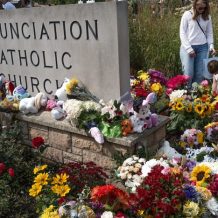A new study reveals that Generation Z has higher church attendance rates than older generations of American adults, marking a reversal of long-established patterns.

The Barna Group has released new research as part of its State of the Church initiative, revealing that Gen Z churchgoers attend services more frequently than their counterparts in older generations. The data included in the report is based on 5,580 online interviews conducted from January through July of this year.
The research examined the church attendance patterns among 3,579 churchgoing adults. Among all adult churchgoers, the average attendance rate was 1.6 times per month. That number rose to 1.9 times per month among Gen Z, which refers to the youngest group of American adults. Millennials, referring to the next youngest group of American adults, are close behind with an average attendance rate of 1.8 times per month.
The average attendance rate among Generation X, measured at 1.6 times per month, was equivalent to the average attendance rate among adults as a whole. Both baby boomers, referring to Americans born between 1946 and 1964, and elders, referring to adults born before 1946, had an average monthly attendance rate of 1.4 times per month.
After examining data collected from 132,030 U.S. adults dating from January 2000 to July 2025, Barna found that monthly church attendance rates among the two youngest groups of American adults nearly doubled from 2020 through 2025. The average attendance rate of 1.9 times per month among Gen Z and 1.8 times per month among millennials constitutes a record high among both groups.
“The fact that young people are showing up more frequently than before is not a typical trend,” Barna Vice President of Research Daniel Copeland said in reaction to the research. “It’s typically older adults who are the most loyal churchgoers. This data represents good news for church leaders and adds to the picture that spiritual renewal is shaping Gen Z and millennials today.”
While the data collected by Barna showed increased church attendance among the youngest generations of American adults, the opposite trend has emerged among the two oldest generations. In 2000, the average church attendance rate among elders was 2.3 times per month. The average church attendance rate of 1.4 times per month among the oldest group of American adults amounts to a record low.
Among baby boomers, the average church attendance rate was measured at 2.0 times per month in 2000. That figure had dropped to 1.4 by 2025, dipping to an even lower rate in 2020, at the height of the COVID-19 lockdowns.
Among Gen Xers, the average attendance rate has not changed all that much in the past quarter century, registering at 1.4 times per month in 2000 and 1.6 times per month in 2025. As was the case with the baby boomers, the average church attendance reached a record low during the COVID-19 lockdowns.
The new research published by Barna comes as other studies have found that younger Americans and Gen Zers are less engaged in church than their older peers.
Last month, a new installment in the American Bible Society’s State of the Bible USA: 2025 report examined the level of respondents’ “involvement in the life, mission, and community of a local church” that “includes learning and growing in one’s faith, meaningful relationships with people in the church, and active use of one’s gifts in the work of the church.”
Breaking down the results by generation show that Gen Zers have the lowest levels of church engagement, with the youngest groups of Americans less likely to agree with statements asserting that they have had “opportunities to learn and grow in my faith,” they have a “best friend at church,” “there is someone in my church who encourages my spiritual development,” “my pastor, or other church leaders, seem to care about me as a person” and that they have had opportunities to use their “giftings.”
 English
English Português
Português Español
Español Français
Français











